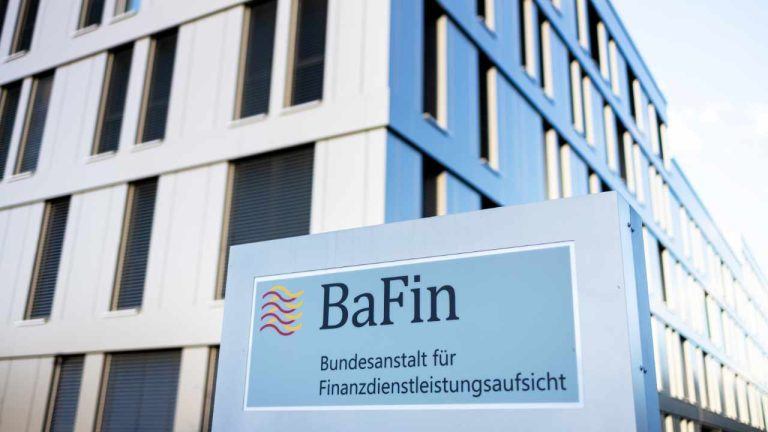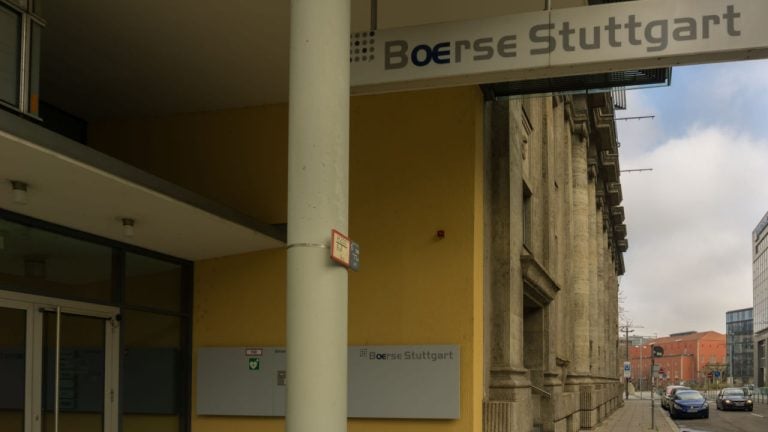 European exchange group Boerse Stuttgart has announced a major step into Ethereum staking, offering users a secure, insured way to earn passive income through its Bison trading platform. By partnering with top German firms, Bison enables staking for as little as 0.005 ETH with weekly rewards. The service, currently only in Germany, promises annual returns […]
European exchange group Boerse Stuttgart has announced a major step into Ethereum staking, offering users a secure, insured way to earn passive income through its Bison trading platform. By partnering with top German firms, Bison enables staking for as little as 0.005 ETH with weekly rewards. The service, currently only in Germany, promises annual returns […] Germany’s Federal Financial Supervisory Authority (BaFin) has seized 13 unauthorized cryptocurrency ATMs in a nationwide operation involving 60 officers and raids on 35 locations. BaFin reported that the machines facilitated illegal transactions and posed money laundering risks. Under German law, trading currencies, including cryptocurrencies, without proper authorization is illegal, with violators facing up to five […]
Germany’s Federal Financial Supervisory Authority (BaFin) has seized 13 unauthorized cryptocurrency ATMs in a nationwide operation involving 60 officers and raids on 35 locations. BaFin reported that the machines facilitated illegal transactions and posed money laundering risks. Under German law, trading currencies, including cryptocurrencies, without proper authorization is illegal, with violators facing up to five […]

According to Coin ATM Radar, there are currently 38,725 crypto ATMs worldwide, with a vast majority located inside the United States.
Germany’s Federal Financial Supervisory Authority (BaFin) has launched a crackdown on crypto ATMs and seized 13 of these automated cash kiosks from 35 locations, the government regulator announced on Aug. 20.
The German financial regulator conducted the seizures in conjunction with the Federal Criminal Police Office, local law enforcement and Germany’s Bundesbank.
According to the government bureau, the ATM operators “illegally installed” the machines and failed to register them under Section 32 of the Banking Act. BaFin claimed that the exchange of euros to cryptocurrencies or vice versa breached the Banking Act.

BitGo originally announced it was setting up two regulated custodial entities in Germany and Switzerland in February 2020.
Major cryptocurrency custody firm BitGo is reportedly expanding its regulatory compliance in Germany more than three years after launching a dedicated local subsidiary.
BitGo has obtained a cryptocurrency license from the German Federal Financial Supervisory Authority (BaFin), according to a Nov. 1 report by Finance Magnates. The firm has been storing crypto assets like Bitcoin (BTC) for its clients since 2019 under the supervision of BaFin as part of a transitional regime, the report notes.
The German license secures BitGo's presence in the European market and is an important milestone for BitGo, BitGo Europe managing director Dejan Maljevic said.
“BaFin is recognized as one of the world’s key trendsetters in crypto regulation,” Maljevic noted, adding that the license “enables the progress that digital currencies entail while creating a secure regulatory framework.”
BitGo and BaFin have not yet responded to Cointelegraph’s request for comment.
Headquartered in Palo Alto, California, BitGo originally set up two regulated custodial entities in Germany and Switzerland in February 2020. BitGo’s German subsidiary, BitGo Deutschland GmbH, immediately started providing custody services in Germany and was expected to apply for regulatory approval in November 2020.
BitGo then secured a New York Trust license in March 2021, which allowed the firm to operate as an independent custodian in the state.
The news comes shortly after BitGo raised $100 million in a Series C financing round in August 2023, bringing the company’s valuation to $1.75 billion. Backed by major investment firms like Goldman Sachs and Galaxy, BitGo reportedly initiated discussions regarding at least two prospective deals using the new funding.
Related: Germany's blockchain funding increases 3% amid market downturn: Report
BitGo’s regulatory milestone in Germany is another sign of growing cryptocurrency adoption in the country. According to an October 2023 report by Chainalysis, Germany is the second largest cryptocurrency economy in the Central, Northern and Western Europe region after the United Kingdom.

BaFin reportedly advised Binance that CEO Changpeng Zhao wouldn’t pass a “fit and proper” test as part of the financial watchdog’s licensing regime.
The German Federal Financial Supervisory Authority, or BaFin, reportedly advised crypto exchange Binance to withdraw its licensing application based on concerns with CEO Changpeng Zhao (CZ) and the firm’s structuring.
According to a July 28 report from The Wall Street Journal, BaFin advised Binance that Zhao may not have passed a “fit and proper” test under the financial watchdog’s regulatory guidelines. The regulator’s guidelines for a license application state managing directors — in this case referring to CZ — must “have the required professional qualification and be of good repute to manage an institution and must dedicate sufficient time to performing their functions.”
BaFin also reportedly told Binance the company’s structure hindered regulatory supervision. Binance announced on July 26 that it had withdrawn its application in Germany, saying at the time the decision was based in part on focusing the company’s effort to become compliant with the European Union’s Markets in Crypto Assets (MiCA) framework.
A spokesperson for Binance told Cointelegraph The Wall Street Journal story was inaccurate. The exchange did not provide a specific response on the details regarding CZ at the time of publication.
In the United States, Binance faces legal actions brought by the Securities and Exchange Commission (SEC) and Commodity Futures Trading Commission (CFTC) for allegedly violating securities laws and trading guidelines, respectively. Lawyers for the exchange requested the dismissal of the CFTC lawsuit in a July 27 court filing, claiming the commission had exceeded its authority.
Binance and CZ claim CFTC oversteps jurisdiction in legal filing, call for lawsuit dismissal. https://t.co/49viHYuHGE
— Cointelegraph (@Cointelegraph) July 28, 2023
Related: Binance may have lied to US lawmakers, argue senators: Report
Though no criminal charges have been filed at the time of publication, reports suggested the U.S. Department of Justice has been investigating Binance for violating U.S. sanctions on Russian entities. Binance chief strategy officer Patrick Hillmann announced on July 6 he would be leaving the firm, reportedly in response to the DoJ probe.
Though it's one of the largest crypto exchanges in the world, Binance has no brick-and-mortar headquarters. Reports have suggested that CZ has had a home in Dubai since 2021, but the SEC had difficulty issuing the CEO a legal summons in June.
Magazine: Binance humiliated, HK needs 100K crypto workers, China’s AI unicorn: Asia Express

The crypto exchange’s move to withdraw its license in Germany comes amid reports that the exchange faced rejection from regulators.
Binance has withdrawn its cryptocurrency custody license application in Germany. The exchange confirmed its withdrawal to Cointelegraph on July 26, nearly a month after reports of rejections from The German Federal Financial Supervisory Authority (BaFin).
On June 29, BaFin reportedly rejected the crypto exchange’s custody license. However, at the time, it was unclear whether the regulator officially denied Binance’s application or if it verbally informed the company. However, Binance has now confirmed that it has formally withdrawn its license application.
A spokesperson from Binance told Cointelegraph that it intends to re-apply for a license in Germany, with changes to its application reflecting the changes in the regulatory environment:
“Binance confirms that it has proactively withdrawn its BaFin application. The situation, both in the global market and regulation, has changed significantly. Binance still intends to apply for appropriate licensing in Germany, but it is essential that our submission accurately reflects these changes.“
Binance CEO Changpeng Zhao said it would focus on becoming compliant with the European Union’s Markets in Crypto-Assets (MiCA) regulations to offer its services in European countries. However, its European expansion plans have taken a setback amid its regulatory troubles in the United States.
The crypto exchange is facing multiple investigations in the U.S. from financial regulators. The crypto exchange is also under investigation in France since early 2022.
Related: Don’t follow the US: Blockchain Aus CEO hammers ‘regulation by enforcement’
Before its withdrawal from Germany, the crypto exchange also exited the Dutch market after failing to secure a virtual asset service provider license from regulators in the country. The crypto exchange also applied to wind down its services in the United Kingdom and Cyprus.
Collect this article as an NFT to preserve this moment in history and show your support for independent journalism in the crypto space.
Magazine: Crypto City guide to Sydney: More than just a ‘token’ bridge

Binance’s regulatory trouble continues to mount as the exchange faced pushback in Europe after the US.
The Federal Financial Supervisory Authority (BaFin), the German financial regulator has reportedly rejected Binance’s crypto custody license application.
The news was first reported by Forward Finance citing people familiar with the matter. Later Cointelegraph reached out to Binance to confirm the same and a spokesperson from the firm said that they are “unable to share details of conversations with regulators,” while adding:
“We continue to work to comply with BaFin‘s requirements. As expected, this is a detailed and ongoing process. We are confident that we have the right team and measures in place to continue our discussions with regulators in Germany.”
Based on the comments from Binance and the exclusive report, it is unclear whether BaFin has officially rejected Binance’s bid to acquire the license or verbally informed of the same and the exchange may withdraw the license in the near future.
The reported denial of a custody license hinders Binance’s advertising plans in Germany. As per law, only licensed firms can advertise in the country. However, Binance still remains a large trading platform with a reported 2 million customers.
Binance’s struggle with regulators continues to mount as the exchange finds itself in regulatory soup quite similar to 2021 when the exchange faced regulatory warnings from more than half a dozen countries.
Related: Don’t follow the US: Blockchain Aus CEO hammers ‘regulation by enforcement’
After its recent regulatory troubles in the United States, Binance's CEO has proclaimed its focus on the European market and become compliant with the Market’s Crypto Assets (MiCA) regulations. However, just like the U.S., the crypto exchange has faced regulatory pushback in many European countries as well.
A recent report revealed that the exchange has been under investigation in France since early 2022 on “aggravated money laundering” charges. The exchange had to recently exit the Dutch market after failing to secure a virtual asset service provider license from regulators in the Netherlands. The crypto exchange also applied to wind down its services in the United Kingdom and Cyprus.
Magazine: Crypto City guide to Sydney: More than just a ‘token’ bridge

Germany’s banking industry is slowly warming up to the crypto sector, with multiple partnerships and crypto services launching in 2023 after a long, cautious approach.
Germany’s largest banking institution, Deutsche Bank, has reportedly applied for a digital asset custody license to the country’s financial regulator, the Federal Financial Supervisory Authority, or BaFin, in a bid to expand its revenue streams, Bloomberg reported.
This comes after a similar shift from the bank’s investment arm, DWS Group, and aims to expand on digital asset custody services, including cryptocurrencies. DWS Group had previously indicated an interest in investing in two German crypto firms. Companies negotiating with DWS Group included Deutsche Digital Assets, a crypto exchange-traded products provider, and market maker Tradias.
The banking giant’s corporate bank division first revealed plans to offer digital asset-related services in 2020 but hadn't announced a timeline for the introduction of the services. Deutsche Bank’s commercial banking unit head David Lynne announced on June 20 that the lender is building its “digital assets and custody business,” and that it has applied for a license with the country’s financial regulator, according to Bloomberg.
While Deutsche Bank has been critical of Bitcoin (BTC) and the crypto market’s volatility over the past few years, its tone toward the industry has altered in 2023. In February this year, Deutsche Bank Singapore, in partnership with Memento Blockchain, successfully completed trials for a tokenized investment platform called DAMA (Digital Assets Management Access).
The digital asset fund was created with its own soulbound token and launched a direct fiat-to-digital on-ramp for users.
Related: Almost half of Germans to invest in crypto: Report
Separately, German securities processor Deutsche WertpapierService Bank (Dwpbank) also created a Bitcoin-focused platform, wpNex, for retail customers. The new platform offers crypto accounts alongside bank clients' other accounts without requiring them to do any additional Know Your Customer processes.
Germany’s banking institutions had kept a safe distance from the crypto industry citing its volatile nature and unpredictability, however, that stance appears to be changing in 2023 as major baking institutions continue to explore the potential of adding digital asset-centered services for clients.
Magazine: Best and worst countries for crypto taxes — plus crypto tax tips
 Blocknox, a subsidiary of one of Europe’s largest stock exchanges, Boerse Stuttgart, has been licensed to operate as a crypto custodian in Germany. The authorization will allow the company to offer custody services for digital assets to institutional investors across the Old Continent. Boerse Stuttgart Subsidiary Blocknox to Offer Crypto Custody Services Under Bafin License […]
Blocknox, a subsidiary of one of Europe’s largest stock exchanges, Boerse Stuttgart, has been licensed to operate as a crypto custodian in Germany. The authorization will allow the company to offer custody services for digital assets to institutional investors across the Old Continent. Boerse Stuttgart Subsidiary Blocknox to Offer Crypto Custody Services Under Bafin License […]
With the licensing of the German exchange’s blocknox service, it now offers fully regulated brokerage, trading, and custody.
Boerse Stuttgart Digital, the digital asset brand of the Boerse Stuttgart exchange group, announced March 30 that its blocknox service has received final licensing from the German Federal Financial Supervisory Authority (BaFin) to operate as a crypto custodian. Boerse Stuttgart Group now offers fully regulated brokerage, trading, and custody of digital assets, it said.
Its final licensing makes Boerse Stuttgart Digital the first “established market participant […] Licensed to hold cryptocurrencies in custody without any acquisitions,” Boerse Stuttgart Group CEO Matthias Voelkel said. Boerse Stuttgart Digital said European banks, brokers, asset managers and family offices could incorporate its services into their own offerings. It operates exchanges in Germany, Sweden and Switzerland and has an office in Ljubljana, Slovenia, as well.
Related: Institutional crypto custody: How banks are housing digital assets
Bitcoin Group SE, operator of the German bitcoin.de crypto trading platform, acquired Bankhaus von der Heydt, which was licensed for crypto custody, in December. German asset manager DZ Bank partnered with Swiss Metaco to offer crypto services, including custody, in February.
Ritterschlag für die @bsdex_official: Sie bekommt die offizielle #BaFin-Lizenz für die Verwahrung von #Kryptowährungen.https://t.co/MV8vUicatH
— BTC-ECHO (@btcecho) March 30, 2023
Boerse Stuttgart Digital has been providing custody services through blocknox under a provisional license since crypto custody regulations were introduced in Germany on Jan. 1, 2020. It had begun offering trading services to German residents in the prior month and introduced a trading app in 2021. Boerse Stuttgart Digital received its final custody licensing ahead of several other contenders, including Binance.
Global exchange group Nasdaq announced plans on March 24 to set up a limited-purpose trust company to offer crypto custody services under the supervision of the New York Department of Financial Services. This comes after the United States Securities and Exchange Commission moved to impose new rules making it harder for cryptocurrency exchanges to custody crypto by expanding rules originally formulated in 2009.
Magazine: ‘Account abstraction’ supercharges Ethereum wallets: Dummies guide